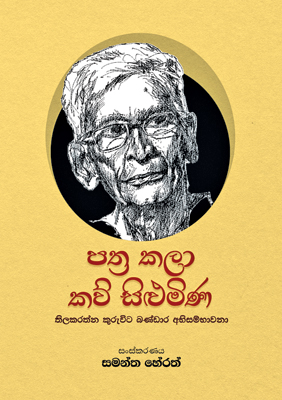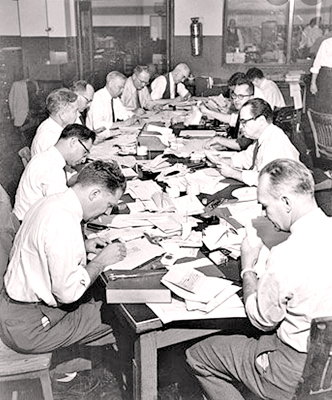The role of newspaper editors has long been a topic of scholarly investigation. It reflects the influence of newspapers on public discourse. The historical evolution of this role has been a focal point in early studies, charting a trajectory from partisan advocacy to a more balanced and objective stance.
This transformation is indicative of the changing landscape of journalism and the increasing demand for impartiality in news reporting.
Scholars have probed into the intricacies of the editorial decision-making process, revealing a complex interplay of various factors. News values, audience preferences, and corporate interests all contribute to the shaping of news content. Understanding how editors go through these dynamic forces is essential for gaining insights into the intricacies of the news production process.
 The significance of newspaper editors is exemplified by the case of Silumina, the revered Sinhalese weekly in Sri Lanka. This publication serves as a cultural and scholarly cornerstone for the country, with its chair reserved for individuals of extraordinary literary prowess and scholarly achievement. Figures like Martin Wickramasinghe, who held this prestigious position, embody the intellectual depth expected of those in such editorial roles.
The significance of newspaper editors is exemplified by the case of Silumina, the revered Sinhalese weekly in Sri Lanka. This publication serves as a cultural and scholarly cornerstone for the country, with its chair reserved for individuals of extraordinary literary prowess and scholarly achievement. Figures like Martin Wickramasinghe, who held this prestigious position, embody the intellectual depth expected of those in such editorial roles.
Tilakaratne Kuruwitabandara, a one-time editor of Silumina, stood out not only for his physical presence—a tall, slim individual—but for the intellectual richness he brought to the position. His life has become a subject of admiration, prompting the publication of an entire volume dedicated to his legacy. The essays within were penned by his contemporaries, editorial staff, and various other personalities, underscoring the profound impact he had on those around him.
Boundaries of Editorial Excellence
Newspaper editorials, in general, serve as the pinnacle of humanities disciplines. They are not merely reports of current events but also reflections on language, history, and culture. Editors, through their careful crafting of editorials, contribute to the preservation and evolution of language. Their analyses often delve into historical contexts, connecting the present to the past and fostering a deeper understanding of cultural dynamics.
With the advent of digital platforms, editors have a broader canvas to explore innovative ways of presenting information. The intersection of technology and humanities disciplines provides new tools for analysing and understanding the vast amount of data generated by news organisations. This intersection enhances the accessibility and impact of editorials, reaching a wider audience and fostering a more engaged public discourse.
Kuruwitabandara’s manipulative understanding of language further emphasises the role of newspaper editorials as a bastion of linguistic excellence. His mastery of language highlights the importance of linguistic precision and eloquence in effectively conveying ideas and shaping public opinion through the written word.
In essence, newspaper editorials, exemplified by individuals like Kuruwitabandara, stand at the crossroads of language, history, and culture, playing a pivotal role in shaping the intellectual landscape of societies.
Newspaper editorial departments can be considered the pinnacle of humanities disciplines. They act as a multifaceted platform that engages with language, history, and various cultural and current affairs. These editorials shape public opinion, contributing to the intellectual and cultural discourse of a society.
Language, History, and Culture to Shape Informed Perspectives
Editors, such as Tilakaratne Kuruwitabandara, who possesses a profound understanding of language, use words strategically to articulate complex ideas, convey nuanced perspectives, and influence readers. The careful choice of language in editorials not only communicates information but also reflects the cultural and historical contexts that shape the discourse.
 Editorials often delve into historical contexts, connecting current events with their historical roots. By providing historical perspectives, editors contribute to a more comprehensive understanding of unfolding events. This historical consciousness is essential for readers to grasp the evolution of societal issues and appreciate the continuity of certain themes over time.
Editorials often delve into historical contexts, connecting current events with their historical roots. By providing historical perspectives, editors contribute to a more comprehensive understanding of unfolding events. This historical consciousness is essential for readers to grasp the evolution of societal issues and appreciate the continuity of certain themes over time.
Cultural analysis is a recurring theme in newspaper editorials. Editors explore and interpret cultural phenomena, helping readers navigate the complexities of societal norms, traditions, and values. Through these insights, editorials contribute to the preservation and evolution of cultural identities, fostering a deeper appreciation for diversity and historical continuity.
Editorials also serve as a platform for informed commentary on current affairs. They go beyond mere reporting, providing analytical insights and interpretations that help readers make sense of the world around them. This engagement with current affairs positions newspaper editorials as a dynamic source of information that actively contributes to ongoing conversations and debates.
Intersection of Technology and Linguistic Expertise
Digital tools and platforms offer editors new ways to present information, analyse data, and engage with audiences. Social media, interactive graphics, and multimedia elements enhance the accessibility and impact of editorials, facilitating a more dynamic exchange of ideas in the digital age.
Tilakaratne Kuruwitabandara, as a newspaper editor, stands as a compelling case study exemplifying the crucial importance of linguistic mastery and wordsmith scholarship in the field. His prowess in language not only shaped the quality of his editorials but also played a pivotal role in defining his legacy as a distinguished editor of Silumina.
Kuruwitabandara’s wordsmith scholarship extended to a deep understanding of cultural subtleties. This cultural literacy enabled him to navigate and dissect complex cultural issues in his editorials. His nuanced analysis, grounded in an appreciation of cultural diversity, contributed to a richer and more insightful interpretation of societal events.
Language mastery extends beyond the immediate context, encompassing the ability to place events in a broader historical framework. Kuruwitabandara, through his editorials, demonstrated a keen awareness of historical contexts, connecting current events with their antecedents. This historical consciousness added depth and perspective to his writings, offering readers a more comprehensive understanding of unfolding narratives.
A wordsmith scholar like Kuruwitabandara elevates the craft of journalism to an art form. His editorial proficiencywas not just informative but they were in fact literary compositions that resonated with readers. This elevation of language in journalism contributes to the cultural and intellectual enrichment of society, transcending the mundane and transforming news into a form of literary expression.
Kuruwitabandara’s mastery of language serves as an inspiration for future generations of journalists and editors. His legacy demonstrates the transformative power of words and the enduring impact that a skilled wordsmith can have on public discourse. Aspiring editors can look to his example as a model for how linguistic proficiency can be a driving force behind meaningful journalism.
The role of a newspaper editor has transformed remarkably in the digital era, demanding a broader understanding of the humanities as a discipline. While traditionally focused on selecting, editing, and presenting news content, newspaper editors now stand at the forefront of shaping public discourse, fostering critical thinking, and preserving cultural heritage in an increasingly digitised world. Consequently, their work necessitates a profound engagement with the humanities, encompassing a diverse range of knowledge and skills that extend far beyond mere technical proficiency.
The humanities, as an expansive field of study, delves into the exploration of human thought, culture, and expression, offering a rich tapestry of insights into human behaviour, social dynamics, and the intricacies of the world we inhabit. Newspaper editors, immersed in the humanities, can effectively navigate the vast sea of information circulating in the digital age, discerning credible sources, evaluating narratives, and identifying patterns that inform their editorial decisions. They transcend mere disseminators of information and become curators of knowledge, ensuring that the content they present is grounded in a deep understanding of human history, culture, and societal norms.
This is an era of misinformation and disinformation, and the role of the newspaper editor as a humanities scholar has become more critical. The ability to critically analyse information, assess sources, and identify biases is essential for combating the spread of false narratives and upholding journalistic integrity. Editors trained in the humanities can effectively interrogate texts, uncover underlying assumptions, and expose hidden agendas, providing a critical lens through which readers can engage with the news.
Newspaper editors are custodians of cultural heritage, bear the responsibility of preserving and disseminating historical narratives, literary works, and artistic expressions that shape our collective understanding of the world. They can curate archives, promote the works of marginalised voices, and ensure that the rich tapestry of human creativity is not lost in the digital age. They contribute to the preservation of collective memory and the transmission of cultural values across generations.









